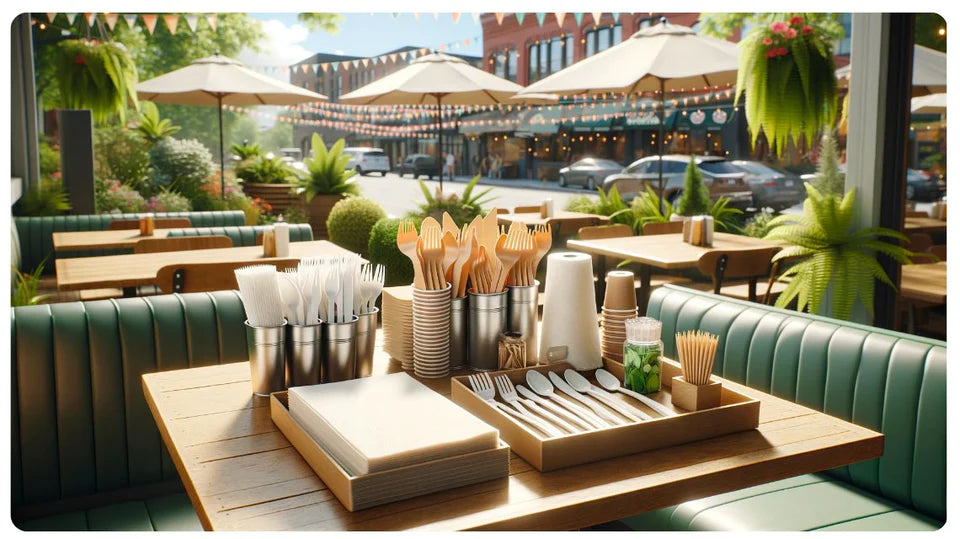In today's environmentally conscious world, food service businesses are facing increasing pressure to adopt sustainable practices. One area where significant changes are taking place is in the realm of disposable cutlery.
As regulations tighten and consumer demand for eco-friendly options grows, wooden forks are emerging as a popular and sustainable alternative to traditional plastic utensils.
Importance of Sustainable Utensils
The food service industry is undergoing a significant transformation, moving away from single-use plastic cutlery towards more environmentally friendly alternatives. This shift is driven by several factors:
- Increasing environmental awareness among consumers
- Stricter regulations on single-use plastics
- Growing corporate responsibility initiatives
Wooden forks and PLA (Polylactic Acid) forks are at the forefront of this transition, offering food service businesses a way to meet both regulatory requirements and customer expectations.
Benefits of Wooden Forks in the Food Service Industry
Wooden forks offer numerous advantages that make them an attractive option for cafes, restaurants, takeout services, and caterers:
Eco-Friendly Credentials
- Biodegradable: Unlike plastic, wooden forks naturally decompose, reducing long-term environmental impact.
- Compostable: They can be composted along with food waste, contributing to circular economy initiatives.
- Renewable Resource: Made from sustainably harvested wood, these forks help conserve non-renewable resources.
Durability and Aesthetic Appeal
Wooden forks are surprisingly sturdy and capable of handling a variety of foods without breaking or bending. Their natural appearance adds a touch of elegance to meals, aligning perfectly with the aesthetics of modern, eco-conscious eateries.
Versatility in Food Service
Whether you're running a busy takeaway, a food delivery service, or a dine-in restaurant, wooden forks are up to the task. They're particularly well-suited for:
- Takeout containers
- Outdoor events and catering
- Fast-casual dining establishments
Choosing the Right Fork for Your Business:
When selecting wooden forks for your food service operation, consider the following factors:
1. Material Quality
Opt for forks made from high-quality, food-grade wood. For instance, the 6.2" Wooden Fork from HD BioPak offers excellent quality and durability.
2. Durability
Ensure the forks can withstand the rigors of your specific food offerings. Test them with various dishes to guarantee they meet your standards.
3. Customer Preferences
Consider surveying your customers to understand their preferences regarding sustainable utensils. Many appreciate the natural feel of wooden forks over plastic alternatives.
4. Cost Considerations
While wooden forks may have a higher upfront cost compared to plastic, factor in the potential for increased customer satisfaction and compliance with regulations.
5. Scent
Some wooden utensils may have a subtle natural scent. If this is a concern, look for options like the 6.2" Individually Paper Wrapped Wooden Fork, which can help minimize any wood odor.
6. Bulk Ordering and Customization
Many suppliers offer bulk ordering options, which can help reduce costs. Some, like HD BioPak, even provide customization services, allowing you to brand your wooden forks for a unique touch.
7. Alternatives to Consider
While wooden forks are excellent, you might also explore options like the Compostable Bio Fork or the 80651 Bio Fork for situations where a non-wood alternative is preferred.
Government Policy on Plastic Waste
It's crucial to stay informed about regulations affecting single-use plastics in your area. In Canada, for example, the federal government has implemented a ban on checkout bags, cutlery, food service ware, ring carriers, stir sticks, and straws that are made from or contain problematic plastics.
The Single-use Plastics Prohibition Regulations prohibit the manufacture, import, and sale of these items. This policy underscores the importance of transitioning to sustainable alternatives like wooden forks.

Conclusion
The shift towards wooden forks and other sustainable cutlery options is more than just a trend—it's a necessary evolution in the food service industry. By embracing these eco-friendly alternatives, businesses can:
- Comply with increasingly stringent environmental regulations
- Meet the growing consumer demand for sustainable practices
- Differentiate themselves in a competitive market
- Contribute to reducing plastic waste and environmental impact
As a food service business owner or manager, making the switch to wooden forks is a small change that can have a significant positive impact. It demonstrates your commitment to sustainability, enhances the dining experience for your customers, and positions your business as a forward-thinking leader in the industry.
Remember, the journey towards sustainability is ongoing. Stay informed about new products, regulations, and consumer preferences to ensure your business remains at the forefront of eco-friendly practices in the food service industry with HD BioPak.

